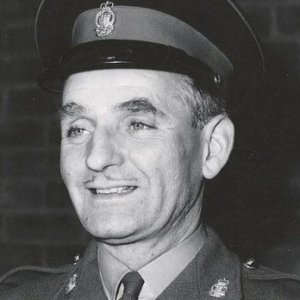- SURNAME
Brazier
- FORENAME
Sidney
- UNIT
Royal Army Ordnance Corps
- RANK
Warrant Officer First Class
- NUMBER
14120781
- AWARD
George Medal, Mention in Despatches
- PLACE
Aldershot, Hampshire, England 1963 (GM) Cyprus 1st July - 31st December 1958 (MiD)
- ADDITIONAL INFORMATION
born 8.12.1919 Rotherham, Yorkshire
educated Rotherham Grammar School
employed by Rotherham Forge (steel industry)
R.A.O.C. 1946
served Korean War
from 1957-74 served in Cyprus, Aden, England, Northern Ireland and Kuwait
commissioned 1965
Head of Bomb Disposal, Northern Ireland 1970
Government Explosives Officer, Kuwait 1972-78 (Army and civilian)
retired as Captain
consultant, Control Risks 1979
married Audrey Price March 1949 Rotherham (3 daughters Linda, Jacqueline and Caroline,1 son Stephen)
died 12.5.2016
London Gazette 41679, 10th April 1959, Page 2418 (MiD)
London Gazette 43238, 4th February 1964, Page 1127 (GM)
CITATION:
George Medal : At Aldershot on the 12th October 1963, Major Musson was called on to investigate the finding of a number of partially buried grenades on a grassy bank. Owing to the vicinity of married quarters and a railway, and because the extent of the cache was not known, it was necessary to make a detailed examination before demolition on the site could be effected. The grenades, known as Sticky Bombs and now obsolete, had no metal covers and were without any packaging. They were glass bottles holding nitre-glycerine. Some were leaking.
On the 13th October, Major Musson assisted by Conductor Brazier, using short wooden probes extracted twelve grenades most of which were embedded in the soil and stuck together. These they removed to a distance of some 160 yards, but the extent of the cache could still not be determined. On the 14th October they continued with their hazardous work wearing rubber gloves and using a paint brush because of the danger that even slight vibration might cause the exuded and highly sensitive nitro-glycerine to explode. During the day they found stuck together, some thirty-eight grenades three of which were cracked and leaking. Together they extracted and carried away eight of these. There being no means of separating the remaining thirty grenades careful preparations were made to destroy them where they lay.
Major Musson and Conductor Brazier were at work on their dangerous task for a total of nine hours.
The final demolition took place the following day and was accomplished with only minor damage to property.
For his courage and devotion to duty whilst personally supervising and directing the examination, removal and destruction of a number of grenades found on a grassy bank at Aldershot. These obsolete war-time relics, consisting essentially of nitroglycerine in glass bulbs, some of which were leaking, were in a highly dangerous condition.
On the 13th October, Major Musson assisted by Conductor Brazier, using short wooden probes extracted twelve grenades most of which were embedded in the soil and stuck together. These they removed to a distance of some 160 yards, but the extent of the cache could still not be determined. On the 14th October they continued with their hazardous work wearing rubber gloves and using a paint brush because of the danger that even slight vibration might cause the exuded and highly sensitive nitro-glycerine to explode. During the day they found stuck together, some thirty-eight grenades three of which were cracked and leaking. Together they extracted and carried away eight of these. There being no means of separating the remaining thirty grenades careful preparations were made to destroy them where they lay.
Major Musson and Conductor Brazier were at work on their dangerous task for a total of nine hours.
The final demolition took place the following day and was accomplished with only minor damage to property.
For his courage and devotion to duty whilst personally supervising and directing the examination, removal and destruction of a number of grenades found on a grassy bank at Aldershot. These obsolete war-time relics, consisting essentially of nitroglycerine in glass bulbs, some of which were leaking, were in a highly dangerous condition.
WEB LINKS:
https://www.thegazette.co.uk/London/issue/41679/supplement/2418 (MiD)https://www.thegazette.co.uk/London/issue/43238/supplement/1127 (GM)
NATIONAL ARCHIVES:
https://discovery.nationalarchives.gov.uk/details/r/D7623777 (GM)
Last edited by a moderator:




